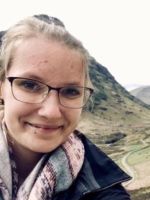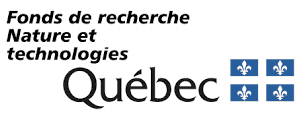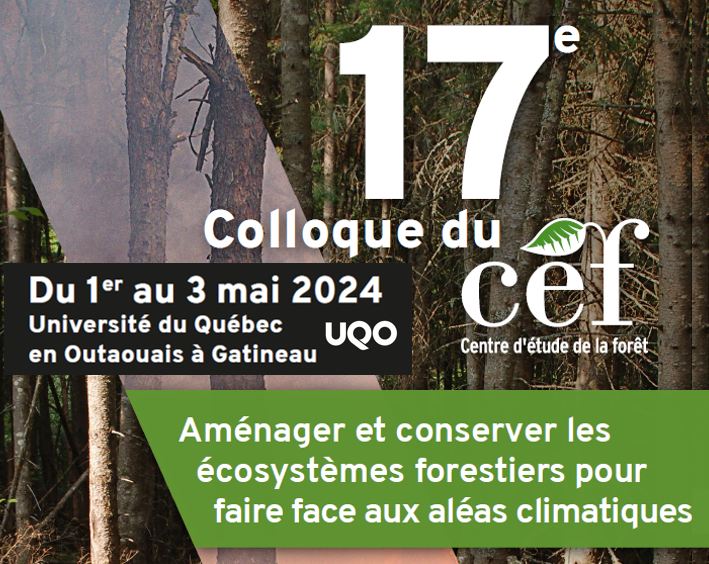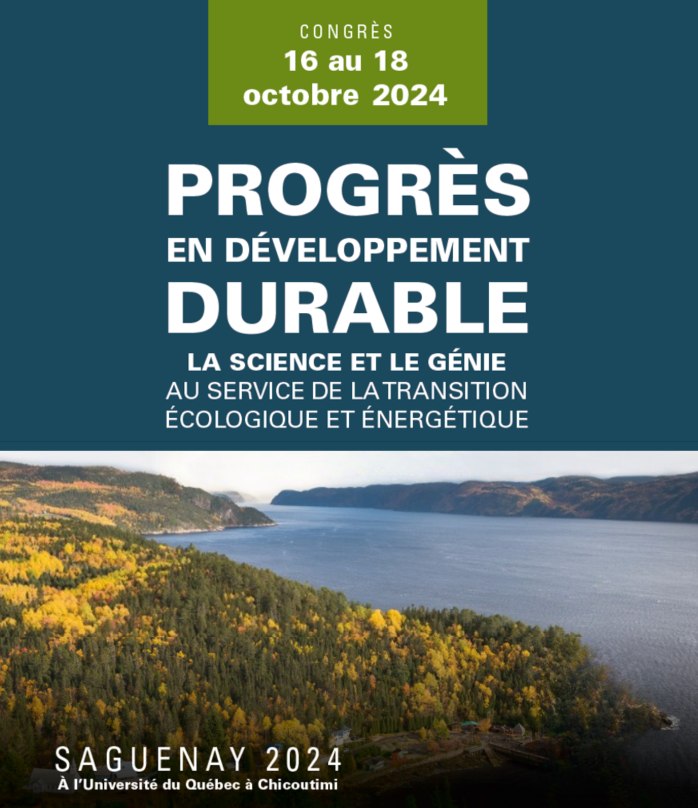CONFOR 2008 - See you next year in Toronto!
See comments from Guy Chevrette et Richard Desjardins at the téléjournal from Radio-Canada Estrie.
CONFOR 2008
Graduate Student Conference on Forestry and Environmental Sciences
For information, write to
January 31st - February 3rd 2008
Mont-Orford National Park, Centre de villégiature Jouvence
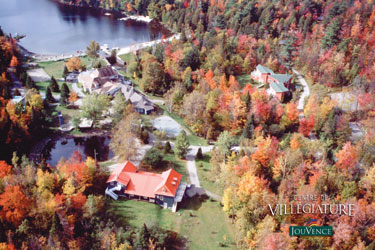
The graduate students of the CFR invite you to CONFOR 2008!
Graduate students from the Center for Forest Research (CFR) will be hosting the 22nd edition of the Graduate Students Conference on Forestry and Environmental Sciences (CONFOR 2008), a conference for graduate students, by graduate students. The conference will be held from January 31st to February 3rd 2008, at the Centre de villégiature Jouvence, a nature resort located in the Mont-Orford national park..
CONFOR is for you if you are a graduate student in one of the following fields:
| Forest management | Ecophysiology |
| Soil Sciences | Wildlife management |
| Entomology | Pathology |
| Ecology and Environmental Studies | Silviculture |
| Wood science | Agroforestry |
| Genetics | Hydrology |
| Sustainable Management | International Forestry |
| Forest economics and politics | Social Forestry |
| Remote Sensing | Carbon Sequestration |
Students are invited to present their research at this conference either as an oral communication or as a poster. Please note that the conference is also open to students who do not wish to present.
What is the CFR The Centre for Forest Research (CFR, CEF in French) is a new network created with the amalgamation of two research centres that were unique to Quebec (CRBF and GREFi). The CFR brings together the expertise of 51 scientists at eight universities (Concordia, McGill, UQAC, UQAM, UQAT, Université de Montréal, Université de Sherbrooke and Université Laval), and more than 250 graduate students (masters and doctorate). Traditionally, CONFOR travels every year and is organized by a different group of students, allowing it to reach a new group of participants. This year, we decided to take advantage of this new network and form the organization committee with students and resources from different universities in the CFR. For more information on the CFR, please visit their web site (here).
The Centre for Forest Research (CFR, CEF in French) is a new network created with the amalgamation of two research centres that were unique to Quebec (CRBF and GREFi). The CFR brings together the expertise of 51 scientists at eight universities (Concordia, McGill, UQAC, UQAM, UQAT, Université de Montréal, Université de Sherbrooke and Université Laval), and more than 250 graduate students (masters and doctorate). Traditionally, CONFOR travels every year and is organized by a different group of students, allowing it to reach a new group of participants. This year, we decided to take advantage of this new network and form the organization committee with students and resources from different universities in the CFR. For more information on the CFR, please visit their web site (here).
Theme
The Canadian forest industry is presently undergoing one of the most challenging times in its history. Environmental degradation, economic sustainability, societal concerns, and many other factors need to be considered when examining the adaptation of resource management practices to the current situation. The CONFOR 2008 program seeks to explore these issues through informed discussion and exchange and provide a forum for students, researchers, government, and industry. The theme of CONFOR 2008: “Innovation, the future of forestry in a changing climate” focuses on the need for new ideas and solutions. Keynote speakers linked to different aspects of the problem will present their views on the subject and debate the issues in a formal mediated event.
Location
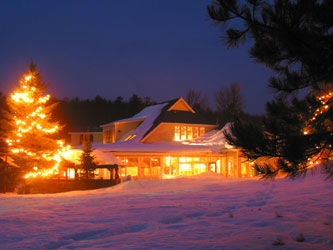 Nestled in the heart of Parc du Mont Orford, on the shore of Stukely Lake, le Centre de villégiature Jouvence is a nature resort that offers comfort and tranquility. The entire conference will be held onsite: meetings, presentations, activities, leisure time, and lodging. This will allow participants to maximize the value of the conference for professional exchange and enjoyment of the natural splendor of the Jouvence. The program also includes social and sports activities selected by the organizational committee, you will have access to the following activities and equipment at the site:
Nestled in the heart of Parc du Mont Orford, on the shore of Stukely Lake, le Centre de villégiature Jouvence is a nature resort that offers comfort and tranquility. The entire conference will be held onsite: meetings, presentations, activities, leisure time, and lodging. This will allow participants to maximize the value of the conference for professional exchange and enjoyment of the natural splendor of the Jouvence. The program also includes social and sports activities selected by the organizational committee, you will have access to the following activities and equipment at the site:
- Trekking
- Hiking
- Cross-country Skiing
- Snowshoeing
- Sledding
- Skating
- Broomball
- Finnish Sauna
- Outdoor Spa
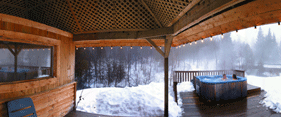
Bring your warm clothes, snow suit, skates and bathing suit!
For more information on Jouvence, visit their web site (Jouvence) ![]() .
.
Accomodations
Participants will be accommodated in units close to the conference rooms and dining room. Accommodation fees are included in the registration fee. However, in order to maximize the number of students who can participate at a reasonable cost, we ask you to find partners with whom you would like to share a double bed or a room. Priority will be given on a first come, first served basis (throught registration).
How to get there
Le Centre de villégiature Jouvence is located in the Mont-Orford National Park at 131, chemin de Jouvence à Orford, near Sherbrooke (see maps).
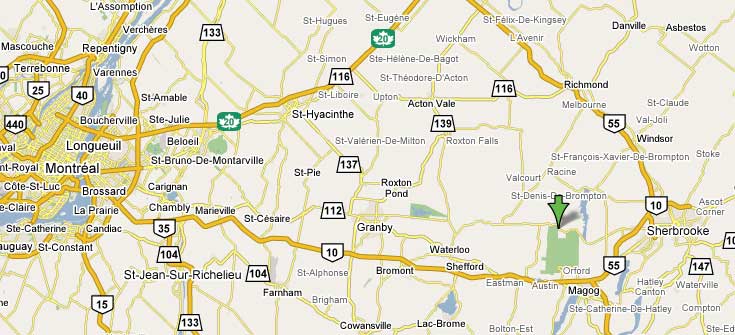
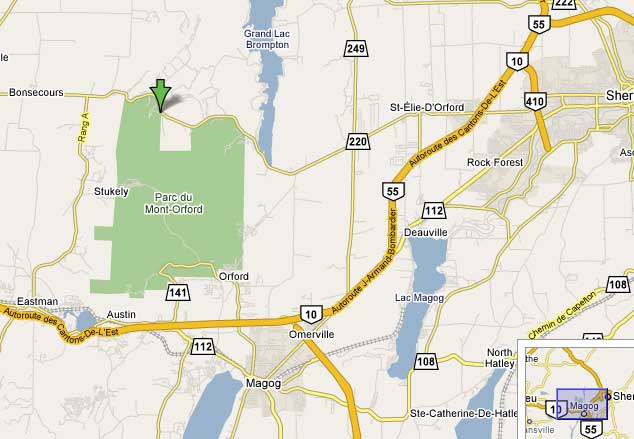
Directions
From Montreal
From Autoroute des Cantons-de-l'Est (Autoroute 10), take Exit 118 towards Orford. About 2,5 km (1½ mile) after the exit, turn right on Alfred-Desrochers Road. Drive 9 km to Route 220. Turn left and continue 10 km (6 miles) until you come to a sign for Jouvence.
From Quebec City
Leave Autoroute Jean Lesage (Autoroute 20) a few kilometres after Drummondville, following Autoroute 55 in direction of Sherbrooke (southbound). Drive 80 km (about 50 miles) on 55, then take Exit 137 (Saint-Élie-d'Orford) in direction of Bonsecours. Jouvence is about 17 km (10 miles) from Saint-Élie-d'Orford on Route 220.
From the United States
From Vermont, take Interstate 91 to the US-Canada border, following through on Autoroute 55, northbound towards Magog. Take Exit 137 (Saint-Élie d'Orford) in direction of Bonsecours on Route 220. Jouvence is about 17 km (10 miles) from the exit.
Carpooling
In order to reduce transportation costs and greenhouse gases emissions, we encourage you to carpool with others students from your region. We are providing an on-line billboard where you can post your offers or requests.
Schedule
| Thursday, January 31st | |
| 15h00 | Registration and poster installation |
| 17h00 | Ice breaker |
| 19h00 | Welcome |
| 20h00 | Wine and cheese |
| Friday, February 1st | |
| 07h00 | Breakfast |
| 08h30 | Presentation session |
| 10h15 | Coffee break and poster session |
| 10h45 | Presentation session |
| 12h00 | Lunch |
| 13h00 | Poster session |
| 13h30 | Keynote speakers |
| 14h30 | Coffee break and poster session |
| 15h00 | Debate |
| 16h00 | Cocktail |
| 18h30 | Supper |
| 20h00 | Social activities |
| Saturday, February 2nd | |
| 07h00 | Breakfast |
| 08h30 | Presentation session |
| 10h15 | Coffee break and poster session |
| 10h45 | Presentation session |
| 12h00 | Lunch |
| 13h00 | Keynote speaker |
| 13h45 | Coffee break |
| 14h00 | Presentation session |
| 15h30 | Outdoor activities |
| 18h30 | Banquet |
| 20h00 | Social activities |
| Sunday, February 3rd | |
| 09h30 | Brunch |
| 12h00 | Participants depart |
Participation
Registration fees:
Registration will be paid by the CFR for student members who will present a communication (talk or poster). If your supervisor or co-supervisor is a regular member of the CFR, you don't need to send a check, simply register online! You can find a list of the regular members of the CFR at this page ![]() and see if it applies to you.
and see if it applies to you.
Student participants (before December 20th 2007): 175$
Student participants (after December 20th 2007): 200$
Non-student participants: 200$
Registration fees include access to the conference, accomodations, meals, coffee breaks and activities. Payment must be made in the form of a check or money order to CONFOR 2008 before January 7th 2008 to the following address:
CONFOR 2008
Centre d'étude de la forêt
Case postale 8888, succursale Centre-ville
Montréal (Québec) H3C 3P8 Canada
Online registration
To register, please complete the REGISTER FORM before January 7th 2008
If you intend to make a presentation (poster or oral), send your abstract directly to . A decision about your presentation will be send by email and then you will be invited to register by filling the register form.
Abstract submission guidelines
***Deadline for abstracts: December 20, 2007***
Students must submit an abstract if they would like to present a talk or a poster. Abstracts must include the study objectives and essential points of the research. Submissions are limited to 250 words in single-spaced Arial 12-point text with up to four key words, and must include all authors and their contact information. If possible, we are asking participants to submit the abstract in English and French.
Abstracts should be submitted as an MS Word file using the following format: last name_first name_university.doc (For example Beaudin_Robert_UQAT.doc) and sent to: by December 20, 2007.
Poster guidelines
- Dimensions and set-up
Poster spaces will be approximately 150 cm (60”) long by 90 cm (36”) wide. Posters must be in portrait orientation. Poster installation will begin the evening of January 31st and they will be on display throughout the conference. Push pins will be available to attach posters.
Posters may be in English or French. - Poster content
There are no strict rules for poster presentation or layout, however the following elements will be required:- Full name(s) of the author(s)
- Contact information of author(s)
- Title of the research
- Introduction: overview of the research topic and relation to the study. The introduction briefly puts the project in context and proposes the hypotheses to be tested.
- Materials and methods: provides specific details on experimental design and data collection methods, replication, timeframes, etc.
- Results and discussion: original results for the experiment presented visually using photos, tables, graphs, histograms, etc. including interpretation of each figure. The discussion section allows the author to address specific hypotheses presented in the introduction.
- References: this section is optional and can be used to cite key references; the list does not have to be exhaustive.
- Acknowledgements: this section is optional and may be used to indicate funding sources and important contributors to the research.
Guidelines for oral presentations
Presenters will have 15 minutes plus 5 minutes of questions for each presentation. (PLEASE NOTE! Moderators will be strict with time limits to assure that all presentations fit into the program.) A computer projection system will be available with the program Microsoft Powerpoint 2003. Research projects that include results and discussion will be favored in the selection of oral presentations.
- Introduction: overview of the research topic and relation to the study. The introduction briefly puts the project in context and proposes the hypotheses to be tested.
- Materials and methods: provides specific details on experimental design and data collection methods, replication, timeframes, etc.
- Results and discussion: original results for the experiment presented visually using photos, tables, graphs, histograms, etc. including interpretation of each figure. The discussion section allows the author to address specific hypotheses presented in the introduction.
- References: this section is optional and can be used to cite key references; the list does not have to be exhaustive.
- Acknowledgements: this section is optional and may be used to indicate funding sources and important contributors to the research.
Sponsors







Contact us
E-mail:
Mailing address:
CONFOR 2008
Centre d'étude de la forêt
Case postale 8888, succursale Centre-ville
Montréal (Québec) H3C 3P8 Canada
Members of the organizing committee:
- Maryse Marchand (UQÀM): Co-chair, fundraising, web page
() - François Hébert (ULaval): Co-chair and fundraising
() - Kit O'Connor (UQÀM): Treasurer, logistics, fundraising
() - Henrik Hartmann (UQÀM): Communications
() - Samuel Royer-Tardif (UdeS): Accommodation and meals
() - Dave Gervais (Concordia): Scientific review, registration
() - Claudie Desroches (UdeS): Social activities
() - Guillaume Sainte-Marie (UQÀM): Promotional items and logo
() - Philippe LeBel (UdeS): Program
() - Sébastien Renard (UQAT): UQAT representative
()
CONFOR 2009
Following tradition, the organization of the next conference will be passed on to a new group of students in a different location. If you and your colleagues are interested in hosting CONFOR 2009, prepare a presentation (5 minutes max) for the 2008 participants outlining why your group is the ideal candidate. Voting will take place at the closing banquet to determine the location and organizers of the next conference. CONFOR is a unique event, it is up to you to take the torch and make it your own!





